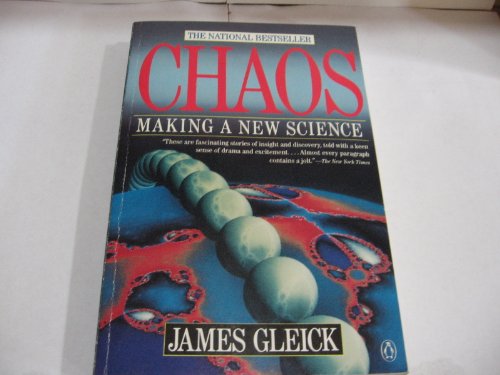
Synopsis
352 pages. Illustré de nombreux dessins en noir et blanc et en couleur, dans et hors texte. Quelques rousseurs sur la tranche. Bon état Couv. légèrement pliée Intérieur frais In-8 Carré Broché The National bestseller. A welcome history dans overview of this brand-new subject.
Les informations fournies dans la section « Synopsis » peuvent faire référence à une autre édition de ce titre.
Présentation de l'éditeur
The million-copy bestseller by National Book Award nominee and Pulitzer Prize finalist James Gleick that reveals the science behind chaos theory
National bestseller
More than a million copies sold
A work of popular science in the tradition of Stephen Hawking and Carl Sagan, this 20th-anniversary edition of James Gleick’s groundbreaking bestseller Chaos introduces a whole new readership to chaos theory, one of the most significant waves of scientific knowledge in our time. From Edward Lorenz’s discovery of the Butterfly Effect, to Mitchell Feigenbaum’s calculation of a universal constant, to Benoit Mandelbrot’s concept of fractals, which created a new geometry of nature, Gleick’s engaging narrative focuses on the key figures whose genius converged to chart an innovative direction for science. In Chaos,Gleick makes the story of chaos theory not only fascinating but also accessible to beginners, and opens our eyes to a surprising new view of the universe.
Présentation de l'éditeur
The million-copy bestseller by National Book Award nominee and Pulitzer Prize finalist James Gleick—the author of Time Travel: A History—that reveals the science behind chaos theory
A work of popular science in the tradition of Stephen Hawking and Carl Sagan, this 20th-anniversary edition of James Gleick’s groundbreaking bestseller Chaos introduces a whole new readership to chaos theory, one of the most significant waves of scientific knowledge in our time. From Edward Lorenz’s discovery of the Butterfly Effect, to Mitchell Feigenbaum’s calculation of a universal constant, to Benoit Mandelbrot’s concept of fractals, which created a new geometry of nature, Gleick’s engaging narrative focuses on the key figures whose genius converged to chart an innovative direction for science. In Chaos, Gleick makes the story of chaos theory not only fascinating but also accessible to beginners, and opens our eyes to a surprising new view of the universe.
Les informations fournies dans la section « A propos du livre » peuvent faire référence à une autre édition de ce titre.
Autres éditions populaires du même titre
Résultats de recherche pour Chaos: Making a New Science
Chaos: Making a New Science
Vendeur : World of Books (was SecondSale), Montgomery, IL, Etats-Unis
Etat : Acceptable. Item in very good condition! Textbooks may not include supplemental items i.e. CDs, access codes etc. N° de réf. du vendeur 00072629204
Acheter D'occasion
Expédition nationale : Etats-Unis
Quantité disponible : 4 disponible(s)
Chaos: Making a New Science
Vendeur : World of Books (was SecondSale), Montgomery, IL, Etats-Unis
Etat : Good. Item in good condition. Textbooks may not include supplemental items i.e. CDs, access codes etc. N° de réf. du vendeur 00092160840
Acheter D'occasion
Expédition nationale : Etats-Unis
Quantité disponible : 4 disponible(s)
Chaos: Making a New Science
Vendeur : World of Books (was SecondSale), Montgomery, IL, Etats-Unis
Etat : Very Good. Item in very good condition! Textbooks may not include supplemental items i.e. CDs, access codes etc. N° de réf. du vendeur 00099843714
Acheter D'occasion
Expédition nationale : Etats-Unis
Quantité disponible : 1 disponible(s)
Chaos: Making a New Science
Vendeur : Gulf Coast Books, Cypress, TX, Etats-Unis
Paperback. Etat : Fair. N° de réf. du vendeur 0140092501-4-19572867
Acheter D'occasion
Expédition nationale : Etats-Unis
Quantité disponible : 2 disponible(s)
Chaos: Making a New Science
Vendeur : Your Online Bookstore, Houston, TX, Etats-Unis
Paperback. Etat : Good. N° de réf. du vendeur 0140092501-3-19777175
Acheter D'occasion
Expédition nationale : Etats-Unis
Quantité disponible : 3 disponible(s)
Chaos: Making a New Science
Vendeur : Orion Tech, Kingwood, TX, Etats-Unis
Paperback. Etat : Good. N° de réf. du vendeur 0140092501-3-21402296
Acheter D'occasion
Expédition nationale : Etats-Unis
Quantité disponible : 1 disponible(s)
Chaos: Making a New Science
Vendeur : Orion Tech, Kingwood, TX, Etats-Unis
Paperback. Etat : Fair. N° de réf. du vendeur 0140092501-4-19839880
Acheter D'occasion
Expédition nationale : Etats-Unis
Quantité disponible : 1 disponible(s)
Chaos: Making a New Science
Vendeur : Wonder Book, Frederick, MD, Etats-Unis
Etat : Good. Good condition. A copy that has been read but remains intact. May contain markings such as bookplates, stamps, limited notes and highlighting, or a few light stains. N° de réf. du vendeur U12M-00086
Acheter D'occasion
Expédition nationale : Etats-Unis
Quantité disponible : 1 disponible(s)
Chaos: Making a New Science
Vendeur : Goodwill of Colorado, COLORADO SPRINGS, CO, Etats-Unis
Etat : acceptable. All pages and the cover are intact, but shrink wrap, dust covers, or boxed set case may be missing. Pages may include limited notes, highlighting, or minor water damage but the text is readable. N° de réf. du vendeur COLV.0140092501.A
Acheter D'occasion
Expédition nationale : Etats-Unis
Quantité disponible : 1 disponible(s)
Chaos: Making a New Science
Vendeur : Used Book Company, Egg Harbor Township, NJ, Etats-Unis
Etat : acceptable. Shows considerable signs of wear and previous use. Can include notes highlighting. A portion of your purchase benefits nonprofits! - Note: Edition & format may differ from what is shown in stock photo & item details. May not include supplementary material such as toys, access code, dvds, etc. N° de réf. du vendeur 584R0H000BV1_ns
Acheter D'occasion
Expédition nationale : Etats-Unis
Quantité disponible : 1 disponible(s)


